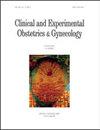Knowledge and Attitude Regarding Non-Invasive Prenatal Testing (NIPT) among Women: A Cross-Sectional Study in Saudi Arabia
IF 0.6
4区 医学
Q4 OBSTETRICS & GYNECOLOGY
引用次数: 0
Abstract
Background: The most prevalent type of inherited intellectual disability worldwide is Down syndrome. Prenatal testing can determine the possibility of a pregnant woman giving birth to an infant with Down’s. Many invasive interventions help with early diagnosis of Down’s. Although high-risk pregnancies should be offered invasive prenatal diagnosis, the International Society for Prenatal Diagnosis encourages non-invasive prenatal screening testing (NIPT) as a primary screening test for all pregnant women, regardless of risk. The present study aimed to determine the knowledge and attitude regarding NIPT among Saudi Arabian women. Methods: This cross-sectional study involving 1028 participants living in Saudi Arabia was conducted from February to March 2023, using a re-designed questionnaire shared among women with pregnancy history. The questionnaire assessed their knowledge, attitudes, and beliefs regarding NIPT. Results: Only 14.8% of our respondents had undergone NIPT; the most common indication was a recommendation from their healthcare provider (41.7%). About 3.4% of the respondents had given birth to a child with Down syndrome, and 22% had relatives with chromosomal abnormalities or genetic diseases. Surprisingly, only 22.3% of the respondents had previously heard about NIPT. The mean knowledge score about NIPT was 2.82 ± 1.89. The mean knowledge score was found to be significantly higher among females who had undergone NIPT, were aged <30, and had high school education. Conclusions: Most Saudi Arabian women have poor knowledge about NIPT and a positive attitude toward it. Thus, the suggestion is to raise awareness about NIPT use, indications, prices, and possible complications.妇女对无创产前检查(NIPT)的知识和态度:沙特阿拉伯的横断面研究
背景:世界范围内最普遍的遗传性智力残疾类型是唐氏综合症。产前检查可以确定孕妇生下唐氏婴儿的可能性。许多侵入性干预有助于唐氏症的早期诊断。尽管高危妊娠应提供侵入性产前诊断,但国际产前诊断协会鼓励将非侵入性产前筛查测试(NIPT)作为所有孕妇的主要筛查测试,无论其风险如何。本研究旨在确定沙特阿拉伯妇女对NIPT的知识和态度。方法:这项横断面研究于2023年2月至3月对居住在沙特阿拉伯的1028名参与者进行了研究,使用了一份重新设计的问卷,在有怀孕史的女性中共享。问卷评估了他们对NIPT的知识、态度和信念。结果:仅有14.8%的受访者接受过NIPT;最常见的适应症是医疗保健提供者的建议(41.7%)。约3.4%的受访者生下了患有唐氏综合症的孩子,22%的受访者有染色体异常或遗传疾病的亲属。令人惊讶的是,只有22.3%的受访者以前听说过NIPT。NIPT知识平均分为2.82±1.89分。在30岁、高中学历、接受过NIPT的女性中,平均知识得分显著较高。结论:大多数沙特阿拉伯妇女对NIPT的了解程度较低,对NIPT持积极态度。因此,建议提高对NIPT使用、适应症、价格和可能的并发症的认识。
本文章由计算机程序翻译,如有差异,请以英文原文为准。
求助全文
约1分钟内获得全文
求助全文
来源期刊
CiteScore
0.50
自引率
0.00%
发文量
241
审稿时长
1 months
期刊介绍:
CEOG is an international, peer-reviewed, open access journal. CEOG covers all aspects of Obstetrics and Gynecology, including obstetrics, prenatal diagnosis, maternal-fetal medicine, perinatology, general gynecology, gynecologic oncology, uro-gynecology, reproductive medicine, infertility, reproductive endocrinology, sexual medicine. All submissions of cutting-edge advances of medical research in the area of women''s health worldwide are encouraged.

 求助内容:
求助内容: 应助结果提醒方式:
应助结果提醒方式:


